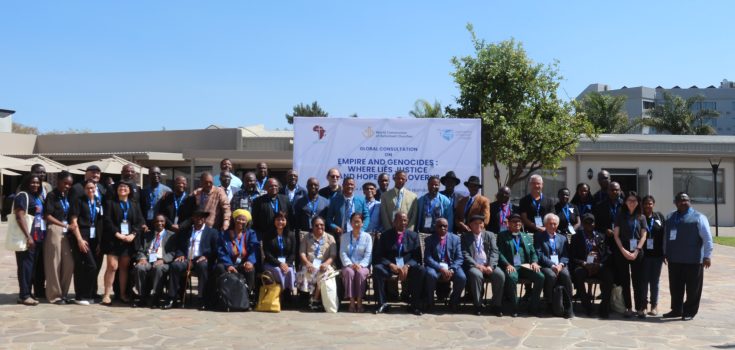- A consultation held between the 20th and 24th of August 2024 called for the churches to recognize and take a concrete stand against genocide. Jointly organized by the All African Conference of Churches, the Council for World Mission and the World Communion of Reformed Churches and locally hosted by the Council of Churches in Namibia in Windhoek, Namibia, the consultation sought to ask what role have the church and ecumenical partners played, and can continue to play, in finding justice for the crucified peoples in post-genocide settings?
The consultation was intentionally held in Namibia which was the location of the first genocide of the 20th century. Starting in 1904 the Herero and Nama people were ordered to be massacred by the German colonial power. The struggle for acknowledgement and apology still continues today. The consultation was essential in the light of the on-going genocide in Palestine.
Bringing together church and ecumenical leaders, traditional authorities, activists, engaged academics but most importantly those who have suffered the injustices of genocide the consultation specifically sought to address the issue from the perspective of those who are being crucified. This intentionality of approach from below allowed those gathered to name Genocide as being part of the mechanics of the necropolitics of Empire.
In its communique the consultation stated, “The conference witnessed the resistance of the crucified, the impoverished, women, young people and children in their steadfast refusal to be erased and annihilated. Our statement arises from the cry of the earth’s people against the geopolitics of empire, the way empire continues to unleash a “necropolitics” (i.e. a politics, practice and even celebration of death)”
The consultation made strong connections between genocide in the modern period and the legacy of colonialism, in his keynote address, the Namibian scholar and activist Paul Isaak made the point that “From the perspective of the colonized, mission and colonialism was dominated by missionaries, traders, settlers and soldiers or what is known as the three Cs: Christianity, Commerce, and Civilization. These three Cs imposed upon Africans a particular way of being.”
In his presentation, Mark Lewis Taylor, renowned theologian from Princeton Theological Seminary, connected those murdered in genocides with the suffering and crucified Christ when we said, “Dying as Jesus did is what puts Christianity’s reputed founder in unity with the world’s peoples who suffer on the underside of the imperial systems, whether Roman or US-American.” It was perhaps with this theological insight in mind that the consultation referred to those who were slaughtered and brutalized in genocides as the ‘crucified’.
Carmen Margarita Sanchez De Leon, brought to the foreground the gendered dimensions of genocide in her presentation when she said, “Women’s bodies are inseparable from the memories of genocide and power structures in society. The biological nature of female or feminised bodies, including their capacity to gestate life, systematically makes women targets of sexualised violence in peacetime as well as during war and genocide.” She called the consultation to recognize that women were not only the victims/survivors of genocide but were also at the forefront of resistance and peace building initiatives.
Speaking of the consultation Philip Vinod Peacock, Executive Secretary Justice and Witness said, “The legacies of colonialism and the continuing onslaught of capitalism has led to a trail of death and destruction. As churches we must acknowledge the misery this has caused and work to put an end to it so that all might have life and have it in its fullest”
James Amanze, reflecting on Can Theology Speak in the face of Genocide, called on the church to “aggressively, decidedly and deliberately use the instruments of reconciliation and peace through its mission of evangelization in order to eradicate genocidal tendencies in society and bring into existence the kingdom of God”
The communique further called on the All Africa Conference of Churches, The Council for World Mission and the World Communion of Reformed Churches to develop a “mechanism for accompanying churches and affected communities of the crucified during genocide and struggles for self-determination. This should include training and supporting a rapid response team and strengthening the pastoral, political, and advocacy actions of churches against genocide in solidarity with those crucified by Empire and its allies.”
The consultation recognized that the root of genocide was empire and neo-liberal capitalism and called on the larger ecumenical community to “ecumenical community to join forces with those who are pursuing alternatives to global capitalism and the furthering of the principles and goals of the NIFEA processes to dismantle the military-industrial complex”
The statement can be found here.


